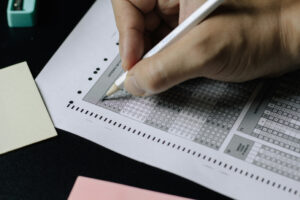Dr. Kevin Johnson, (MA ’14, PsyD ’18) shares his personal experience with studying for, taking, and passing the EPPP. Members of the MSP community who are planning to take the EPPP soon are encouraged to attend our EPPP study group which starts on April 29th. MSP has also partnered with AATBS to provide our students and alumni with discounts on study materials.
 Graduating with your degree often does not mean that you are “done” in the world of psychology. For most of us, especially those wanting to work with clients (you know, to practice the skills you have learned), there is one last hurdle to jump: passing the (in)famous EPPP to become licensed clinicians. As a student, I often heard my professors and other licensed clinicians speak about their experiences with the EPPP. Stories varied from, “I passed my first time no problem” to “I had to take it a dozen times before I passed.” For me, the reality was somewhere in the middle. Having recently passed the EPPP, I wanted to share some of my lessons learned through the process along with having an opportunity to show a more “realistic” example of what taking the EPPP is really like.
Graduating with your degree often does not mean that you are “done” in the world of psychology. For most of us, especially those wanting to work with clients (you know, to practice the skills you have learned), there is one last hurdle to jump: passing the (in)famous EPPP to become licensed clinicians. As a student, I often heard my professors and other licensed clinicians speak about their experiences with the EPPP. Stories varied from, “I passed my first time no problem” to “I had to take it a dozen times before I passed.” For me, the reality was somewhere in the middle. Having recently passed the EPPP, I wanted to share some of my lessons learned through the process along with having an opportunity to show a more “realistic” example of what taking the EPPP is really like.
First, some context; I took the EPPP four times before achieving a passing score. So I became intimately familiar with not only the flow and content of the exam, but the process of actually checking in to the testing center; something that I believe is not spoken to enough. So let me tell you: going through the “check in” process at the testing centers I attended was just as anxiety-provoking as the prospect of taking the exam itself. I jokingly refer to the “check in” process with friends and family as “TSA on steroids.” Not only do you need to provide two pieces of pictured identification, but the centers go so far as to scan the veins in your hand (using a small device) to serve as identification. This, along with the self-administered pat downs on your body, makes even getting into the room to take the exam mentally draining. I found that by the time I actually sat down to take the exam, I was already exhausted. I knew that something needed to change, but I could not put my finger on exactly what it was.
The first few times I took the exam; I do not think I was studying in a way that was conducive to my goal of passing. I tried almost every method of study that was suggested to me. This included different study programs, hard copy versus electronic materials, flash cards, practice exams, and even consideration to see a hypnotist. I was open and ready to consider anything to pass. But it was not until I did not pass my third time that I realized that the problem was not that I did not know the material; it was that I was getting in my own way. It was the way I approached failure that was the problem.
In my experience, most of us do not embrace failure. Embracing failure is equivalent to accepting less than “perfect” and opens ourselves up to pain. And who wants that? I saw this in my own behavior in the days after not passing the exam; I became lethargic, irritable, cynical, and disempowered. I often thought about giving up on the practice of psychology all together. Many of us have probably either experienced these feelings ourselves, and if not I would bet most of you have seen it in your own work with clients and what they bring to therapy. We often find that people remember their failures while disregarding their accomplishments, and I know I am guilty of exactly that.
The single greatest change I felt I made in my process of passing the EPPP was not the study material (although I found I study better with flash cards), but rather my mindset. I had something to prove to myself; I had this sneaky feeling that if I believed in myself and came to the exam with confidence in myself (not my knowledge of the material), I would get a different result. I had to buy into the belief that I was a knowledgeable and competent clinician. Just as all of you are. You will pass the EPPP.
I hope (some) of my story can serve as an example of what I feel is a more realistic example of what taking the EPPP in 2024 is like. In my opinion, the EPPP is as much an exam of patience and understanding of oneself, as it is about the knowledge domains of psychology. It takes courage to fall down and get up again, even if we fail our way into success! Visualize your success. Remind yourself that you are MORE than your EPPP score. And when you do eventually pass, I hope you know that I am so proud of you.

Kevin Johnson, PsyD, LP is a Core Faculty member at MSP.